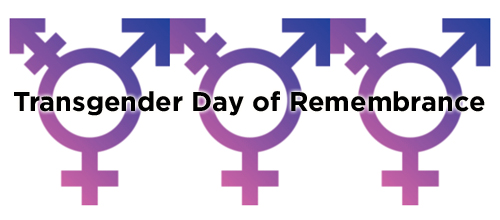
Illuminating the Darkness
 Transgender Day of Remembrance memorializes victims of violence
Transgender Day of Remembrance memorializes victims of violence
by Nancy Ford
On November 11, 1933, the Hamburg City Administration in Germany asked the head of the police department to “pay special attention to transvestites” and to “deliver them to the concentration camps.” In 1938, the Institute of Forensic Medicine recommended that the “phenomena of transvestism” be “exterminated from public life.” The author of these recommendations stated that “draconian measures by the government against stubborn and hard-headed transvestites are…adequate.”
Transgender activists believe that the many tragedies resulting from that first November ruling should be memorialized annually. In 1998, the first Transgender Day of Remembrance (TDR) reminded the world of the violence perpetrated against the transgender community. Held annually each November in major cities throughout the world, TDR first honored Rita Hester, whose murder on November 28 of that year kicked off the “Remembering Our Dead” web project and a San Francisco candlelight vigil in 1999. Hester’s murder remains unsolved.
TDR was introduced to Houston in 2000, and is observed again this month with a ceremony at the University of Houston. Initially, the local observance—which includes speakers, reading of the names of worldwide victims, and a candlelight vigil—was held downtown at City Hall with an audience of approximately 30; it then moved to the Holocaust Museum Houston. “There was a direct link between anti-trans hate faced by trans people today and the anti-trans hate of Nazi Germany, which tore down the world’s first Gender Clinic,” explained Cristan Williams, executive director of Houston’s Transgender Center.
In 2011, growing attendance forced organizers to move the ceremony to the more accommodating University of Houston.
“In the past years, we have averaged between 100 and 125 people,” said Lou Weaver, a Transgender Foundation of America (TFA) board member. “We outgrew the museum.”
Rep. Garnett Coleman and Chuck Smith, interim director for Equality Texas, are confirmed speakers for this year’s event; Resurrection MCC’s choir and Barbara Carroll, a graduate of UH’s music school, provides special musical performances.
Though TDR’s official website, RememberingOurDead.org, states that more than one person per month has died due to transgender-based hate or prejudice over the last decade, Weaver says he is not aware of any trans murders or assaults that have been reported in the Houston area this past year. Regardless, Weaver believes it is important for all members of the LGBT community to recognize violence perpetrated against the transgender community by observing TDR.
“It is important to stand together,” he says. “It helps our allies and advocates to understand the violence against gender-non-conforming individuals. It builds bridges to have others in the room with us.”
Williams agrees. “Anti-trans violence happens to trans and non-trans people alike,” she says. “Transgender Day of Remembrance is a space to recognize and give presence to that truth and heal as a community.”
Weaver says the TFA acts as “advocates” to encourage trans folks to report incidences of violence when they occur. “We help others go to authorities,” he says. “We will actually go with them. We also work with the authorities and the media to ensure proper reporting.” Weaver says the TFA has worked with the local authorities, the FBI, and TABC on previous cases of violence against Houston’s transgender community.
According to its executive director, Williams, the Transgender Center also offers free self-defense classes for transgenders every week.
Transgender Day of Remembrance is presented by Houston Transgender Unity Committee and the UH Main Campus. November 17, 7 p.m. University of Houston’s A.D. Bruce Religion Center. More info: htuc.org.










